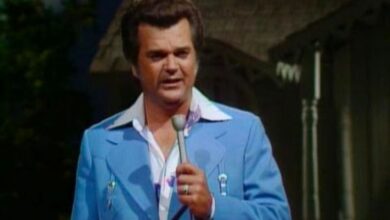Reflecting on Merle Haggard’s Classic Hit: Are The Good Times Really Over?
Merle Haggard’s iconic song “Are the Good Times Really Over” is a poignant reflection on the changing times and the loss of traditional values. Released in 1982 as part of his album “Big City,” the song struck a chord with many listeners who longed for the simplicity and innocence of the past. Haggard, known for his honest and relatable lyrics, captures the essence of nostalgia and yearning for a bygone era in this timeless classic.
The song opens with the melancholic lyrics, “I wish a buck was still silver, and it was back where the country was green.” Haggard laments the loss of the value of money and the beauty of the countryside, painting a vivid picture of a simpler time when life was more straightforward and unspoiled by modernity. The song’s wistful tone is further emphasized by the haunting melody and Haggard’s soulful vocals, evoking a sense of longing and regret.
As the song progresses, Haggard reflects on the changes in society and the erosion of traditional values. He sings about the decline of small-town America, the disappearance of family farms, and the loss of community spirit. The lyrics poignantly ask, “Are we rolling down hill like a snowball headed for hell?” highlighting the fear and uncertainty that many people felt during a time of rapid social and economic change.
Despite its somber themes, “Are the Good Times Really Over” also offers a message of hope and resilience. Haggard reminds listeners that while the world may be changing, there are still things worth fighting for and preserving. He sings, “The best of the free life is still yet to come, and the good times ain’t over for good.” This message of optimism and perseverance resonated with many fans and made the song a timeless anthem for those who longed for a return to simpler, happier times.
Merle Haggard’s “Are the Good Times Really Over” continues to be a beloved classic that speaks to the universal experience of nostalgia and longing for the past. Its timeless themes of change, loss, and hope have ensured its enduring popularity and relevance. As listeners continue to grapple with the challenges of the modern world, Haggard’s poignant lyrics and soulful performance serve as a comforting reminder that the good times may not be over for good.
In conclusion, “Are the Good Times Really Over” stands as a powerful testament to Merle Haggard’s songwriting talent and his ability to capture the emotions and struggles of everyday life. The song’s themes of nostalgia, change, and hope continue to resonate with audiences across generations, making it a timeless classic that will be remembered and cherished for years to come.





